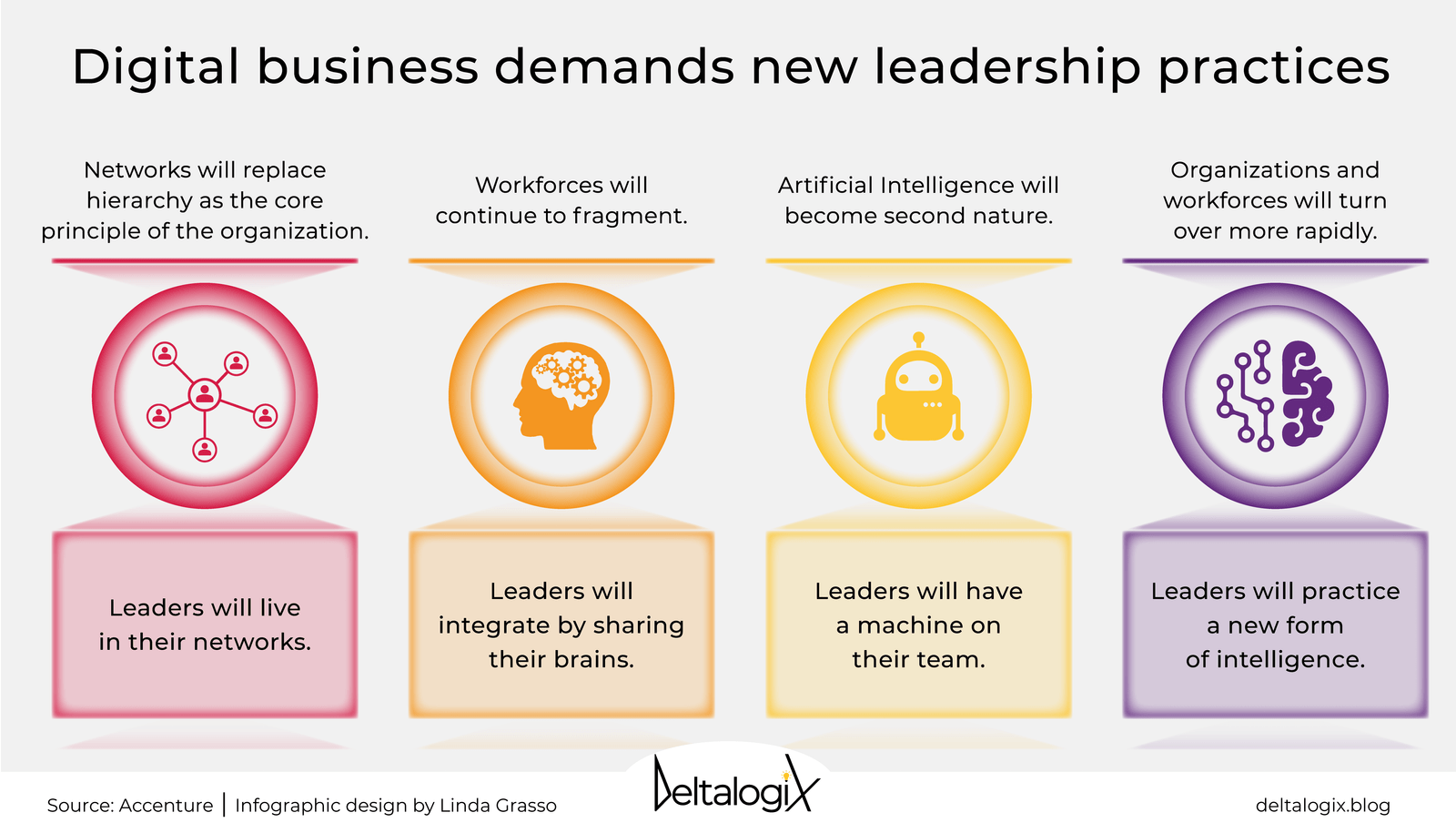
In today’s rapidly evolving digital landscape, open-mindedness plays a crucial role in driving digital transformation and market leadership. Embracing new ideas, technologies, and perspectives allows organizations to stay ahead of the curve and adapt to the ever-changing demands of the market. So, how exactly does open-mindedness fuel this transformative journey and pave the way for market dominance? Let’s explore the power of open-mindedness in driving digital transformation and market leadership.
Digital transformation requires organizations to be agile, innovative, and adaptable. By being open-minded, companies can break free from traditional thinking and embrace new possibilities. Open-mindedness encourages a culture of curiosity, where employees are encouraged to explore new technologies, experiment with different strategies, and challenge the status quo. This mindset fosters creativity and innovation, leading to the development of cutting-edge solutions and disruptive business models.
Moreover, open-mindedness enables organizations to effectively navigate the complexities of the digital landscape. In a world where change is constant and technology is rapidly evolving, being open-minded allows businesses to embrace emerging trends, technologies, and customer preferences. It enables them to identify new opportunities, anticipate market shifts, and proactively respond to customer needs. By staying open to new ideas and perspectives, organizations can position themselves as market leaders, driving innovation and setting the pace for industry-wide transformation.
In conclusion, open-mindedness is a key driver of digital transformation and market leadership. By fostering a culture of curiosity, embracing new ideas, and staying adaptable, organizations can thrive in the digital age. So, let’s embrace open-mindedness and unlock the full potential of digital transformation for a brighter and more successful future.

Open-mindedness plays a crucial role in driving digital transformation and market leadership. By embracing new ideas, technologies, and perspectives, businesses can stay ahead in the ever-evolving digital landscape. Open-mindedness allows organizations to adapt quickly, innovate, and seize opportunities in the market. It fosters a culture of continuous learning and encourages collaboration, leading to the development of cutting-edge solutions and strategies. Embracing open-mindedness empowers companies to navigate digital disruptions, transform their operations, and emerge as market leaders.
How Open-mindedness Drives Digital Transformation and Market Leadership?
Open-mindedness is a crucial mindset that drives digital transformation and market leadership in today’s fast-paced business landscape. In a world where technological advancements and disruptive innovations are constantly reshaping industries, organizations need to embrace open-mindedness to stay ahead of the curve. This article explores the concept of open-mindedness and its profound impact on driving digital transformation and market leadership.
The Power of Open-mindedness
Open-mindedness is the willingness to consider new ideas, perspectives, and possibilities without prejudice or preconceived notions. It is about approaching challenges and opportunities with a growth mindset, embracing change, and being receptive to diverse viewpoints. In the context of digital transformation, open-mindedness is paramount for organizations to adapt, innovate, and thrive in the ever-evolving digital landscape.
Open-mindedness enables organizations to break free from traditional thinking patterns and explore new horizons. It encourages creativity, collaboration, and a culture of continuous learning. By being open-minded, organizations can foster an environment that encourages experimentation, risk-taking, and the exploration of emerging technologies and business models. This mindset allows them to identify untapped opportunities, leverage digital tools and platforms, and create innovative solutions that drive digital transformation.

Embracing Change for Digital Transformation
Digital transformation requires organizations to embrace change wholeheartedly. Open-mindedness plays a pivotal role in this process by enabling leaders and employees to overcome resistance to change and embrace new ways of doing things. It helps organizations challenge the status quo, question existing processes, and seek out innovative approaches to problem-solving.
An open-minded approach to change empowers organizations to adapt to emerging technologies and market trends. It allows them to explore and adopt new digital tools, platforms, and strategies that enhance operational efficiency, customer experience, and business outcomes. Open-mindedness also helps organizations navigate the complexities of digital transformation by encouraging agility, flexibility, and a willingness to iterate and refine strategies based on feedback and evolving market dynamics.
By embracing change with an open mind, organizations can capitalize on the opportunities presented by digital transformation and position themselves as market leaders.
Benefits of Open-mindedness in Market Leadership
Open-mindedness is not only essential for driving digital transformation but also for achieving market leadership. Organizations that cultivate an open-minded culture are better equipped to navigate uncertainties, anticipate market shifts, and outperform competitors. Here are some key benefits of open-mindedness in market leadership:
1. Enhanced Adaptability: Open-mindedness enables organizations to adapt quickly to changing market dynamics, customer preferences, and technological advancements. It empowers them to pivot their strategies, products, and services to meet evolving market demands and stay ahead of the competition.
2. Innovation and Creativity: An open-minded culture fosters innovation and creativity by encouraging diverse perspectives and ideas. It creates an environment where employees feel empowered to think outside the box, challenge conventional wisdom, and contribute innovative solutions. This fuels continuous improvement and allows organizations to develop cutting-edge products and services that resonate with customers.
3. Customer-Centricity: Open-mindedness helps organizations prioritize customer needs and preferences. By being receptive to customer feedback and insights, organizations can tailor their offerings to meet customer expectations, enhance customer experience, and build long-lasting relationships. This customer-centric approach is critical for establishing and maintaining market leadership.
4. Collaboration and Partnerships: Open-mindedness promotes collaboration and partnerships both within and outside the organization. It encourages knowledge-sharing, cross-functional teamwork, and collaboration with external stakeholders, such as customers, suppliers, and industry experts. These collaborations foster innovation, enable access to new markets and resources, and strengthen market leadership.
5. Continuous Learning: Open-mindedness nurtures a culture of continuous learning and improvement. It encourages individuals and organizations to seek out new knowledge, embrace feedback, and invest in professional development. This commitment to learning allows organizations to stay abreast of industry trends, acquire new skills, and adapt to evolving market dynamics, positioning them as market leaders.

In conclusion, open-mindedness is a powerful driver of digital transformation and market leadership. Organizations that embrace open-mindedness are more likely to thrive in the digital age by adapting to change, fostering innovation, and prioritizing customer needs. By cultivating a culture of open-mindedness, organizations can position themselves at the forefront of their industries and lead the way in driving digital transformation and market leadership.
Key Takeaways
- Open-mindedness is crucial in driving digital transformation and market leadership.
- Being open-minded allows businesses to embrace new technologies and adapt to changing market trends.
- Open-mindedness fosters innovation and creativity, leading to the development of groundbreaking digital solutions.
- By being open-minded, businesses can better understand and cater to the needs of their customers in the digital age.
- Open-mindedness enables businesses to stay ahead of the competition and maintain market leadership.
Frequently Asked Questions
Question 1: How does open-mindedness impact digital transformation?
Open-mindedness plays a crucial role in driving digital transformation. When individuals and organizations are open-minded, they are willing to embrace new ideas, technologies, and ways of doing things. This mindset enables them to adapt quickly to the changing digital landscape and seize opportunities for innovation and growth.
By being open-minded, leaders and teams are more receptive to feedback and diverse perspectives, allowing them to identify and address gaps in their digital strategies. Open-mindedness also fosters a culture of experimentation and learning, encouraging organizations to explore new technologies and approaches that can drive digital transformation.
Question 2: How does open-mindedness contribute to market leadership?
Open-mindedness is a key driver of market leadership in the digital age. When leaders and organizations are open-minded, they are better positioned to understand the evolving needs and preferences of their customers. This enables them to develop innovative products and services that meet those needs and stay ahead of their competitors.
Open-mindedness also helps organizations to spot emerging trends and opportunities in the market. By staying open to new ideas and perspectives, leaders can identify untapped markets, develop disruptive business models, and establish themselves as market leaders. Open-mindedness allows organizations to continuously learn, adapt, and evolve to stay relevant in an ever-changing business landscape.
Question 3: How can open-mindedness be cultivated within an organization?
Cultivating open-mindedness within an organization requires a conscious effort from leaders and teams. Firstly, leaders must set the example by being open to new ideas and encouraging diverse perspectives. They should create a safe space for employees to share their thoughts and challenge the status quo.
Organizations can also foster open-mindedness by promoting a culture of continuous learning and curiosity. This can be done through training programs, workshops, and knowledge-sharing initiatives. Encouraging collaboration and cross-functional teams can also help expose individuals to different perspectives and ways of thinking.
Question 4: What are the benefits of open-mindedness in digital transformation?
Open-mindedness brings several benefits to digital transformation efforts. Firstly, it allows organizations to identify and embrace emerging technologies that can drive innovation and efficiency. By being open-minded, organizations can explore new digital tools, platforms, and strategies that can enhance their operations and customer experiences.
Open-mindedness also fosters a culture of agility and adaptability. When individuals and teams are open to new ideas, they are more willing to experiment, fail fast, and learn from their mistakes. This iterative approach is essential in the fast-paced digital landscape where continuous improvement and innovation are key to staying competitive.
Question 5: How can open-mindedness contribute to long-term market leadership?
Open-mindedness is a critical factor in achieving long-term market leadership. By staying open to new ideas and perspectives, organizations can continuously evolve and adapt to changing market dynamics. They can anticipate customer needs and preferences, allowing them to develop innovative solutions that meet those needs.
Open-mindedness also enables organizations to spot new market opportunities and be proactive in taking advantage of them. By embracing new technologies and trends, organizations can position themselves as industry leaders, gaining a competitive edge and staying ahead of their rivals. Ultimately, open-mindedness is a key driver of long-term market leadership in the digital era.

Final Summary
In a rapidly evolving digital landscape, open-mindedness emerges as a key driver of digital transformation and market leadership. This mindset allows businesses to adapt, innovate, and stay ahead of the curve in an ever-changing environment. By being receptive to new ideas, technologies, and perspectives, organizations can unlock new opportunities, foster creativity, and drive growth.
Open-mindedness enables businesses to embrace digital transformation by encouraging a culture of continuous learning and exploration. It empowers teams to challenge the status quo, experiment with new technologies, and adopt agile methodologies. By encouraging collaboration and knowledge-sharing, companies can harness the collective intelligence of their employees, leading to innovative solutions and improved customer experiences.
Moreover, open-mindedness paves the way for market leadership by enabling organizations to anticipate and respond to market trends and customer needs. By actively seeking feedback, listening to customer insights, and staying attuned to industry developments, businesses can tailor their strategies and offerings to meet evolving demands. This customer-centric approach not only enhances customer loyalty but also positions companies as industry leaders, driving competitive advantage and market share.
Ultimately, open-mindedness is the catalyst that propels businesses into the digital age and positions them as market leaders. By embracing this mindset, organizations can navigate the complexities of digital transformation, stay ahead of the competition, and create a culture of innovation and growth. In this dynamic landscape, open-mindedness is not just an option but a necessity for those who strive to thrive in the digital era. So, let us open our minds and embrace the limitless possibilities that await us on this transformative journey.


